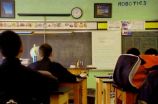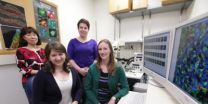(Press-News.org) Scientists at UNC's Frank Porter Graham Child Development Institute (FPG) report that high school students with autism can learn under Common Core State Standards (CCSS), boosting their prospects for college and employment. Newly published recommendations from FPG's team also provide strategies for educating adolescents with autism under a CCSS curriculum.
"The number of students with autism who enter high school settings continues to grow," said Veronica P. Fleury, lead author and postdoctoral research associate with FPG's Center on Secondary Education for Students with Autism Spectrum Disorders. "Many educators may find that they're not prepared to adapt their instruction to meet both state standards and the diverse needs of these students."
In 2010, the National Governors Association Center for Best Practices and the Council of Chief State School Officers released the CCSS for English and mathematics in an effort to better prepare students for college and careers. According to Fleury, the greater demand for a technologically advanced workforce also makes academic skills now even more essential for high school graduates.
"But the college enrollment of people with autism is among the lowest for all categories of disabilities," Fleury said. "In addition, less than 40% of the population with autism is employed—and most of those with jobs only work part-time, without benefits."
However, she said that academic performance in high school plays an important role in opportunities for a college education and employment. Yet, while the CCSS outlines expectations of what educators should teach, it provides no guidance on how to teach these skills to students with or without autism.
Fleury believes the most effective high school instruction requires understanding the complex profile of students with ASD, who possess both strengths and weaknesses.
People with autism have some social deficits and may process language at a slower rate, she said, while many also have enhanced visual processing. Some may have difficulty learning to make calculations, but others are mathematically gifted.
"It's extremely hard to draw general conclusions about academic performance for these students," Fleury said. "But adolescents with autism often do have difficulties comprehending texts, and many find writing a burdensome task."
Fluery added that work in STEM fields (science, technology, engineering, and math) are replacing manufacturing jobs and may provide viable opportunities for many people with ASD. She said people with autism often gravitate to these fields in college, highlighting the need to equip them as high school students with skills that will enable them to compete and achieve.
"While the very structure of high school poses challenges for students with autism, being able to anticipate and understand activities, schedules, and expectations can improve their ability to respond to classroom demands," she said. "Establishing routines and creating written schedules also helps."
In a new article in Remedial and Special Education, Fleury and her co-authors recommended several strategies to educate students with ASD effectively, including exposing them to assignments before presenting the work in class. The researchers also noted a variety of techniques for delivering the highly explicit instruction that teenagers with autism require, such as teaching mnemonic devices for remembering steps in a task.
"High school students with ASD also need ample opportunities to practice skills across settings throughout the school day," she said. "And teaching them to monitor their own behavior can help them to use their skills in a variety of settings."
Fleury added that because there is a strong link between social and academic skills, new research should focus on developing interventions for students with autism that can address both areas of need together.
"We know that when students with autism receive appropriate instruction and supports, many of them are capable of learning academic content that is aligned with state standards," she said. "And better academic performance often leads to a more successful outcome after high school."
INFORMATION: END
Strategies for teaching common core to teens with autism show promise
Academic skills are essential for high school graduates with autism
2014-03-19
ELSE PRESS RELEASES FROM THIS DATE:
New technique makes LEDs brighter, more resilient
2014-03-19
Researchers from North Carolina State University have developed a new processing technique that makes light emitting diodes (LEDs) brighter and more resilient by coating the semiconductor material gallium nitride (GaN) with a layer of phosphorus-derived acid.
"By coating polar GaN with a self-assembling layer of phosphonic groups, we were able to increase luminescence without increasing energy input," says Stewart Wilkins, a Ph.D. student at NC State and lead author of a paper describing the work. "The phosphonic groups also improve stability, making the GaN less likely ...
Chemo-free treatment a possibility for leukemia/lymphoma
2014-03-19
Patients with terminal forms of leukaemia and lymphoma who have run out of treatment options could soon benefit from a new drug, which not only puts an end to chemotherapy and has virtually no side effects but also improves a patient's life expectancy and quality of life.
It has been described as a breakthrough in cancer treatment by a leading professor in haematology, who presented the findings of the Phase 1 trial at an international conference in New Orleans in December 2013.
Professor Simon Rule, Consultant Haematologist at Plymouth Hospitals NHS Trust and researcher ...
Neuroscience 'used and abused'
2014-03-19
Influential policy-informing 'evidence' that children's brains are irreversibly 'sculpted' by parental care is based on questionable evidence.
The researchers warn that the success that advocates of 'brain-based' parenting have had in influencing government policy could undermine parent-child relationships.
The study identified that although there is a lack of scientific foundation to many of the claims of 'brain-based' parenting, the idea that years 0-3 are neurologically critical is now repeated in policy documents and has been integrated into professional training ...
NRL researchers detect water around a hot Jupiter
2014-03-19
Scientists at the Naval Research Laboratory (NRL) are part of a research team that has detected water vapor in the atmosphere of a planet outside our solar system. The team, including scientists from California Institute of Technology, Harvard-Smithsonian Center for Astrophysics, Pennsylvania State University, and University of Arizona, applied a sophisticated Doppler technique to the infrared to directly detect the planet and demonstrate the presence of water in its atmosphere. The discovery is described in the March 10, 2014 issue of The Astrophysical Journal Letters.
The ...
Vanderbilt diabetes researchers track cells' ability to regenerate
2014-03-19
Vanderbilt University scientists have found evidence that the insulin-secreting beta cells of the pancreas, which are either killed or become dysfunctional in the two main forms of diabetes, have the capacity to regenerate.
The surprising finding, posted online recently by Cell Metabolism, suggests that by understanding how regeneration occurs, scientists one day may be able to stop or reverse the rising tide of diabetes, which currently affects more than 8 percent of the U.S. population.
The study "provides clues to how we might learn what signals promote beta-cell ...
Critical illness increases risk of psychological problems
2014-03-19
Fortunately, more and more people survive critical illnesses and accidents. A new Danish-American survey shows, however, that hospitalisation where the patient has received mechanical ventilation can have serious consequences:
- Of course, the good news is that more and more patients survive critical illness and treatment using ventilators. But at the same time, the bad news is that we have now documented that the ventilator patients have a considerable risk of developing psychological problems.
The first few months after discharge are really critical, says professor ...
Multidisciplinary research team led by Tufts CTSI proposes new model for clinical trials
2014-03-19
BOSTON (March 19, 2014) – Experts across academia, industry and government propose a new method for health care providers to get the right treatments to the right patients at the right time. This new approach, A Proposal for Integrated Efficacy-to-Effectiveness (E2E) Clinical Trials, published in Nature Clinical Pharmacology & Therapeutics, recommends a seamless transition from controlled experiments to real-world comparative effectiveness trials. This continuum will improve the accuracy of treatment selection and better determine how those treatments work on different ...
Lied-to children more likely to cheat and lie
2014-03-19
People lie – we know this. People lie to kids – we know this, too. But what happens next? Do children who've been lied to lie more themselves?
Surprisingly, the question had not been asked experimentally until Chelsea Hays, then an undergraduate student in psychology at the University of California, San Diego, approached professor Leslie Carver with it. Now the pair have a paper out in Developmental Science, suggesting that adult dishonesty does make a difference, and not in a good way.
"As far as we know," said Carver, associate professor of psychology and human development ...
Small step towards growing tissue in the lab
2014-03-19
University of Adelaide mathematicians have devised a method for identifying how cell clusters have formed by analysing an image of the cluster.
Published in the Journal of Theoretical Biology, their mathematical modelling tool will be useful in helping biologists and tissue engineers to move towards growing human tissue such as liver in the laboratory.
"When any tissue or organ develops, the cells have to organise themselves into the correct structure," says Dr Edward Green, researcher in the University's School of Mathematical Sciences. "This self-organisation process ...
Ancient DNA shows moa were fine until humans arrived
2014-03-19
A study by Curtin University researchers and colleagues from Denmark and New Zealand strengthens the case for human involvement in the disappearance of New Zealand's iconic megaherbivore, the moa - a distant relative of the Australian Emu.
All nine species of New Zealand moa, the largest weighing up to 250 kilograms, became extinct shortly after Polynesians arrived in the country in the late 13th century.
Researchers have previously suggested, from limited genetic evidence, that huge populations of moa had collapsed before people arrived and hence influences other ...
LAST 30 PRESS RELEASES:
Ten-point plan to deliver climate education unveiled by experts
Team led by UC San Diego researchers selected for prestigious global cancer prize
Study: Reported crop yield gains from breeding may be overstated
Stem cells from human baby teeth show promise for treating cerebral palsy
Chimps’ love for crystals could help us understand our own ancestors’ fascination with these stones
Vaginal estrogen therapy not linked to cancer recurrence in survivors of endometrial cancer
How estrogen helps protect women from high blood pressure
Breaking the efficiency barrier: Researchers propose multi-stage solar system to harness the full spectrum
A new name, a new beginning: Building a green energy future together
From algorithms to atoms: How artificial intelligence is accelerating the discovery of next-generation energy materials
Loneliness linked to fear of embarrassment: teen research
New MOH–NUS Fellowship launched to strengthen everyday ethics in Singapore’s healthcare sector
Sungkyunkwan University researchers develop next-generation transparent electrode without rare metal indium
What's going on inside quantum computers?: New method simplifies process tomography
This ancient plant-eater had a twisted jaw and sideways-facing teeth
Jackdaw chicks listen to adults to learn about predators
Toxic algal bloom has taken a heavy toll on mental health
Beyond silicon: SKKU team presents Indium Selenide roadmap for ultra-low-power AI and quantum computing
Sugar comforts newborn babies during painful procedures
Pollen exposure linked to poorer exam results taken at the end of secondary school
7 hours 18 mins may be optimal sleep length for avoiding type 2 diabetes precursor
Around 6 deaths a year linked to clubbing in the UK
Children’s development set back years by Covid lockdowns, study reveals
Four decades of data give unique insight into the Sun’s inner life
Urban trees can absorb more CO₂ than cars emit during summer
Fund for Science and Technology awards $15 million to Scripps Oceanography
New NIH grant advances Lupus protein research
New farm-scale biochar system could cut agricultural emissions by 75 percent while removing carbon from the atmosphere
From herbal waste to high performance clean water material: Turning traditional medicine residues into powerful biochar
New sulfur-iron biochar shows powerful ability to lock up arsenic and cadmium in contaminated soils
[Press-News.org] Strategies for teaching common core to teens with autism show promiseAcademic skills are essential for high school graduates with autism




